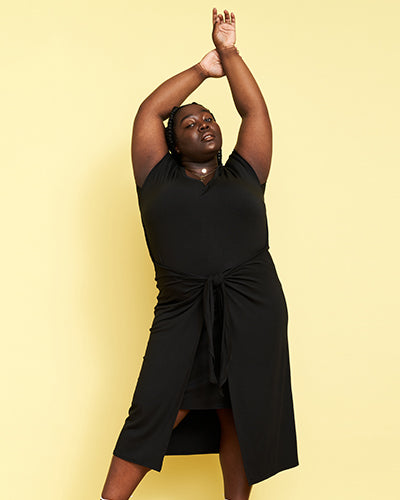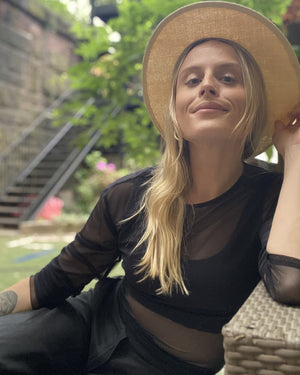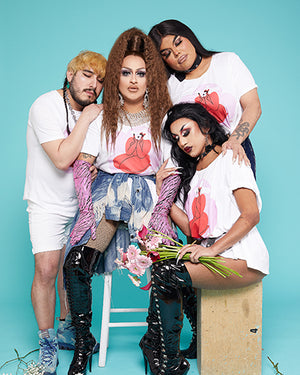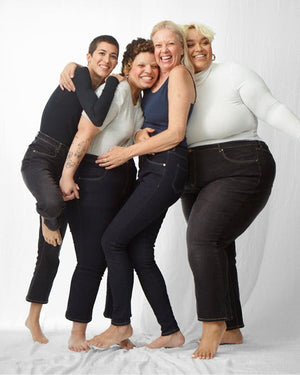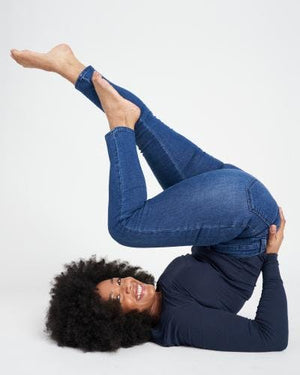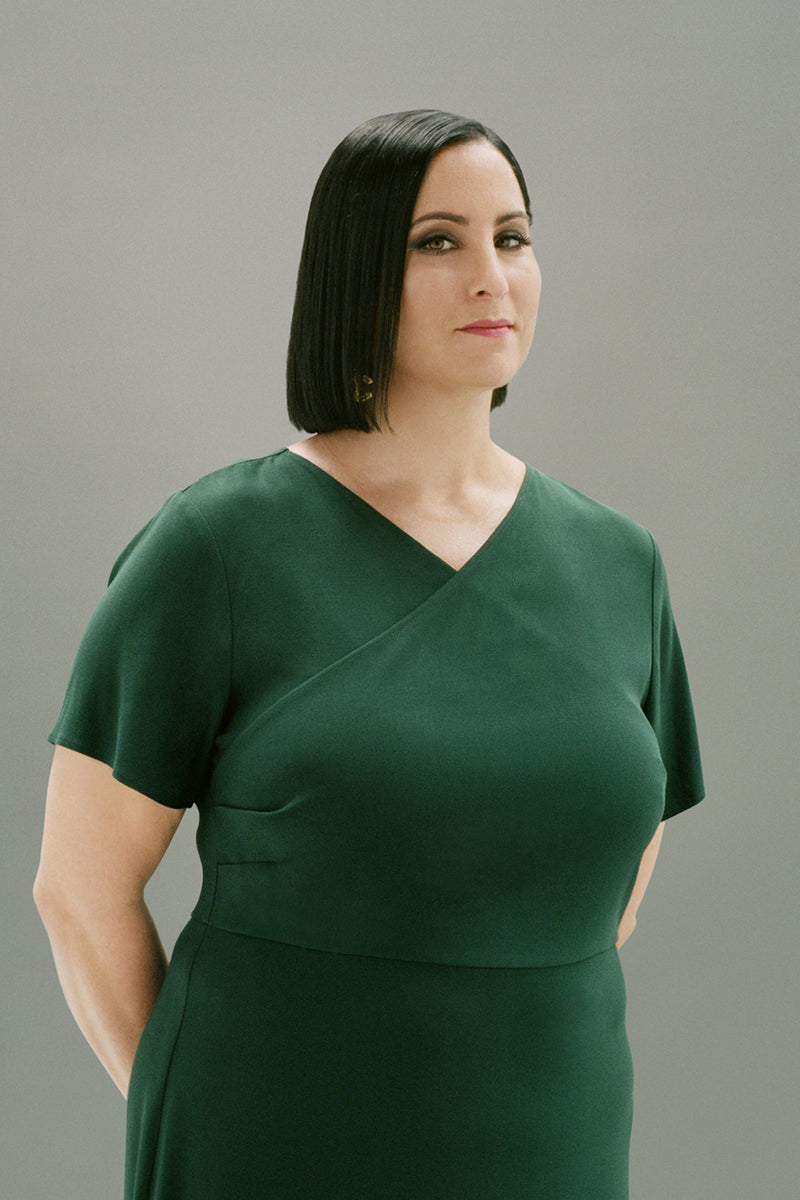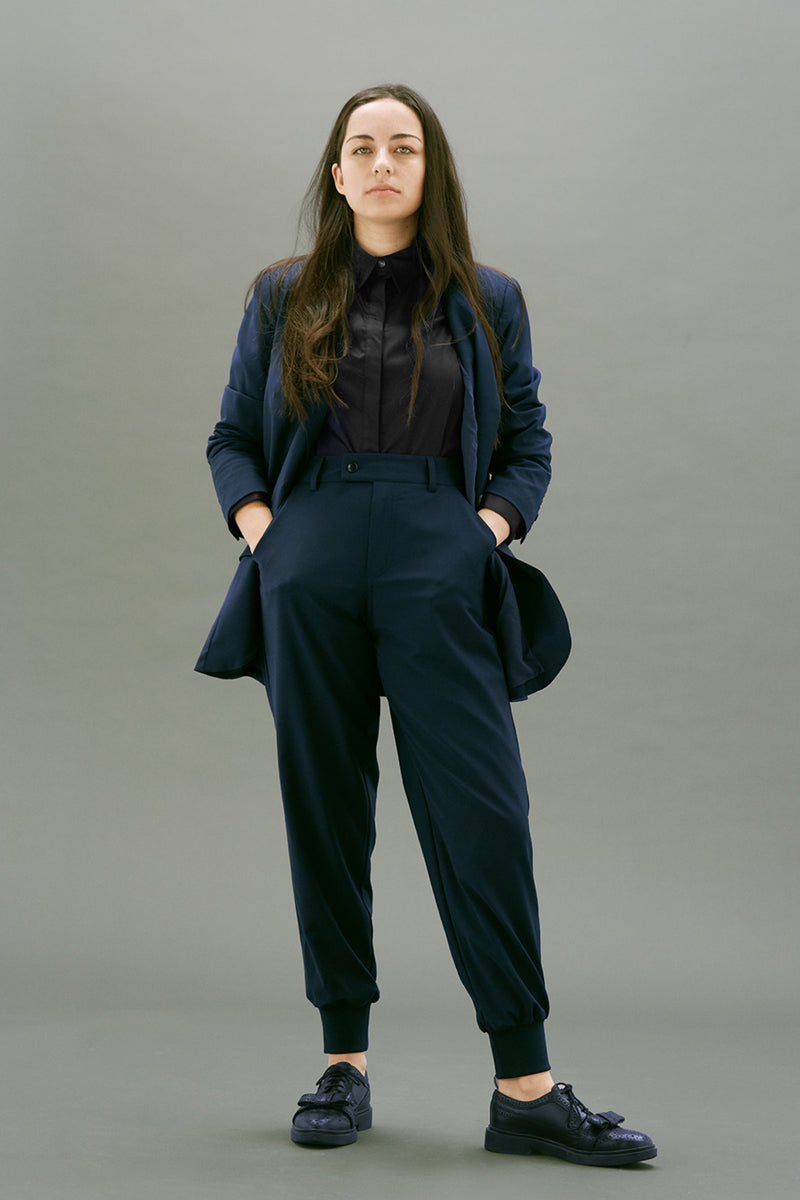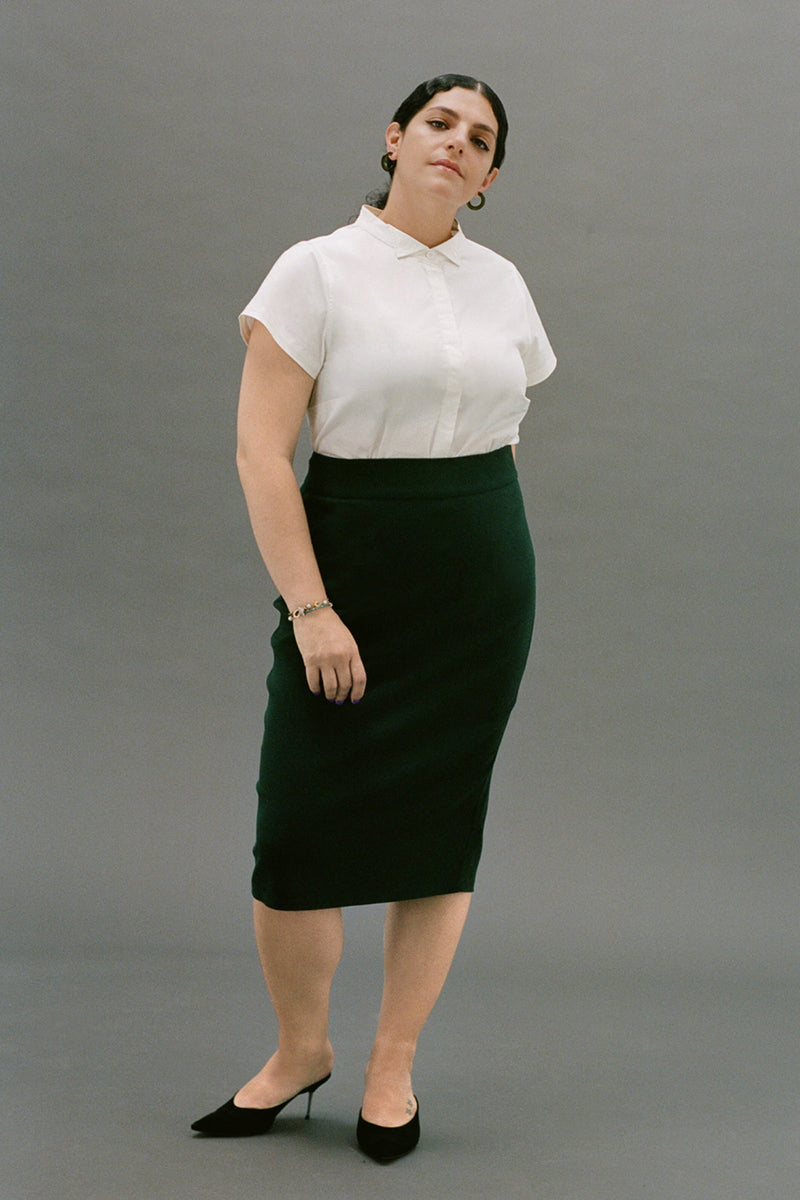
What Does Dressing For Work Actually Mean?
Four visionary women on the concept of traditional workwear and the power of dressing for yourself.
I’ll never forget what I wore to my first job interview, as much as I may want to. I was 22-years-old, a socially anxious closeted lesbian from Cleveland who’d inexplicably moved to Dallas (?) to pursue a career in journalism (??) The interview was at a local newspaper. I asked the professional women I knew what to wear. They all said the same thing: a suit and heels.
I scoured department store racks and outlet malls until I found a dark gray suit with a single-button blazer and a flare leg trouser. It cost enough to empty my checking account, but felt cheap, and the ill-fitting cut combined with the itchy fabric gave me a vague sense of unease almost as soon as I put it on. I added a pointed-toe kitten-heel pump, the type of shoe that made it clear, both in style and my subsequent gait, that I’d never worn anything but a sneaker. When I arrived at the interview, I was sweating and panicky. I already had a blister, and I couldn’t stop buttoning and unbuttoning my blazer. I hated the way I felt, the way I looked. The level of discomfort I experienced made me feel like I didn’t deserve to be there, like I didn’t actually deserve the job I so desperately wanted. I wondered how the clothing everyone told me would be right for a professional environment felt so fundamentally wrong.
I didn’t get the job, by the way.
Flash forward to more than a decade later, and I’d live in a suit if I could. Only now, my suits, blazers, and workwear feel like a choice, not something I put on because I was told to. My personal understanding of classic workwear is no longer prescriptive, or tailored to the male gaze, or overly formal. When I go to work in clothes I love, I feel capable, and that belief in my own capability is reflected in the work I produce.
Of course, the ability to dress the way I choose is rooted in the privilege of my identity, my socioeconomic status, and the creative industry I work in. For many women, there’s still an issue of access — a lot of what’s available on the market is cost prohibitive or limited in size range. Additionally, some workplaces still have staunch, not-so-subtly sexist rules about acceptable office attire — friends in finance or law often complain about pants or flats being “frowned upon.” It’s impossible to ignore the appearance-based discrimination women of color face in the workplace, and workwear in extended sizes is often far more expensive than its identical, smaller counterparts.
All of that said, the attitude towards women’s workwear is changing, and what’s available for them to wear is, too. That combination of creates power — the power to present yourself in the workplace the way you want to. The idea of “dressing for work” is transforming from “wear this to look like that,” to “wear what makes you look like yourself.” In my case, that manifests as a slightly-oversized suit with a cropped hem and sneakers. For Roxane Gay, it’s trying a different cut of blazer. taking a chance on a print. For Jolie Hunt, it’s a dress that makes her ready for anything. For Celine Semaan-Vernon, it’s a blazer that feels like a second skin. For Willa Bennett, it’s pairing a black suit with something unexpected. Their style and approach is different, but their stories are proof that the concept of “dressing for work” should mean dressing for yourself — whatever that means to you.
Read what they have to say, below.
Roxane Gay, author, professor, editor
On how her perception of workwear has changed…
I often thought of workwear as just plain suits and jackets, button-down shirts. But no flair, no style, no comfort. I'm definitely learning that I can take some chances; wear some prints, try some different cuts, and look really good.
On what makes good workwear…
I think what makes workwear most functional — or what makes workwear most successful — is a combination of: functionality, style, comfort, and just pizazz, for lack of a better word. Women, oftentimes, especially in the workplace, we dress for each other. People think we're dressing for men, but please. Men don't give a fuck. So I really think it's a combination of all the above. You want to look cute, but you want to feel comfortable. Especially when you're working eight, to 10, to 12 hours a day. You need to know that that outfit is going to last all day and feel fresh no matter what the day throws at you. So that you can walk into a meeting with a client, you can sit at your desk. And then, of course, you can go out for drinks afterwards.
On the limitations of size...
There's this really pervasive idea that if you are a fat person, that you are sloppy and unkempt, and that you don't dress professionally. What people are overlooking is there are simply no options for us, especially for people who size out of Lane Bryant. If you're over a size 32, you have very few options in the world and oftentimes you have to wear tent-like clothing that has no form or style or shape.That can be incredibly frustrating, and then people look at you and think that you don't care and that you don't know that you are unprofessional, or looking supposedly unprofessional — when really, that's all that's available to you. And, of course, the larger the clothing, the more it costs. And so, there's also an economics issue; that there's a fat tax and you tend to have to pay quite a lot more for clothes that are going to fit. And if you can't afford them, then what are you going to do?
On dressing for the job you want...
I think that when we have a broader range of clothing available, more of us are able to dress for the jobs that we want. Lots of jobs aren't available to people with different kinds of bodies and larger bodies. And that's incredibly frustrating because then it makes it seem like you're not ambitious and that you don't have goals, when of course you do. Most people are ambitious in one way or another. It's really great when women have more choices, where they can choose the kinds of clothing that allow them to express themselves and allow them to be their natural selves.
On the power of well-fitting workwear...
The power of well-fitting workwear is that it makes everyone feel competent, it makes everyone feel like they are going to kick ass and get shit done. And that's really important. When you look good, you feel good. When you feel good, you work better.
Jolie Hunt, Founder & CEO Hunt & Gather
On how her workwear has evolved...
I don't really wear suits and blazers. I love to dress, I love a jumpsuit, I love what I'm wearing now, you know, a chic skirt with an interesting blouse. I started my career wearing suits — exclusively suits — because I thought that's what you had to do in corporate America. Over the past 20 years, I've gotten more comfortable with who I am at work, who I am in life, and I also think you just understand your silhouette a little bit more as you age. It's been really great to just be able to wear more color, more accessories, and to take risks. I still tend to go more toward classics and really sharp basics, but then to elevate them with a statement earring or shoe that really pops.
On the power dress...
I think that evolution from a power suit to a power dress is symbolic of the times that we're living in. We're no longer imitating men in the workplace, but women are actually being celebrated for who they are...I do think that a beautiful dress can bring a level of confidence. A suit to me feels like armor, and a dress to me feels like you are ready for anything that's coming your way.
On making workwear her own...
My signature move is taking a classic and making it my own, and my favorite example of this is Coco Chanel — I’ll wear a shirt or a dress that's completely understated and a big bold earring and a wild shoe, or a fabulous cuff. I tend not to be as trendy with my core pieces, because I want them to last. I think great classic work-wear, you can wear any time, and it's timeless by its very nature.
On what she looks for in workwear...
When I buy workwear, I want something that I don't have to try on, and that I have consistency in the fit and the fabrication. I think it's crucial that it wears well, and that you can pack it and hang it up, and you're not worrying about dry cleaning everything every third minute of wearing it. I also [look for] fabric that moves with you through the day, and as you wear it — it doesn't pill, it doesn't hold wrinkles. I'm looking for function and fashion together, and I also just frankly want to be comfortable in what I'm wearing, I don't want to feel like something is hitting me at the wrong spot. I think that how you dress is such a representation of how you show up in the world, so for me, it's absolutely essential that the foundation feels completely representative of myself, and I think if I'm going to have a bad day or a tougher day, I wear something that gives me that extra level of confidence in the world, because we could all use it.
Willa Bennett, marketing & audience development manager, BDG Media
On why she wears suits...
I wear suits every single day. Sometimes I wear colors — sometimes. Most of the time it's honestly a black suit. I try to personalize it with the shoes, so the shoes are sometimes less "professional," but suits make me feel most confident. I’ll wear a full black suit, white button up — pristine, steamed — and red Converse. When I walk into the room, you’ll probably see my red shoes first. But I'm a young person, so as much as I am in these professional roles — and often the youngest person in most of the rooms I'm in — I still do want to hold onto that and I still want to feel me. That's my way of being myself.
On how she uses workwear to her advantage…
I think it's all about finding the pieces that really speak to who you are as a person and not just dressing to fit in, but dressing to fit in to who you are and to help elevate that. And so I think all of the choices I make on what I wear really come from within. As a young person who works really hard and cares so much about my career, I think for me, workwear is what helps me be perceived for my ideas rather than what I'm wearing. I use it in a weird way to fit in, but also to stand out. I'm a young woman who maybe has less technical professional experience than some people I'm in the room with, but [in a suit] I am dressed the same as them and I definitely deserve to be there. Workwear makes me feel powerful and helps me be perceived on my ideas rather than my age, or my gender, or my sexuality. And for me, that's so important.
Celine Semaan-Vernon, designer, sustainability advocate, writer
On her ideal workwear wardrobe...
My ideal workwear wardrobe would be something that's comfortable, but that’s also made [with] the earth and the environment and the people that are working on them [in mind]. It can be timeless in a lot of ways, and it can move with me and make me feel comfortable and not trapped in the clothes.
On how her approach to workwear has changed...
I started wearing suits when I was 16 years old, because I was just so drawn to the silhouettes, so drawn to menswear — drawn to the look of power I guess, or just being in charge. I started my career very young, so that was very helpful. Today, I don't often wear suits, but I definitely wear blazers, and I guess it's my armor. It makes me feel protected and confident and a little masculine and taken seriously.
On what inspires her workwear choices…
Fashion creates culture, and culture can really mobilize people, so trends get understood in that way. For me personally, it's like a collage of all the different cultures I come from. It could be a little bit more masculine, sometimes a bit more traditional. My workwear needs to fit with the lifestyle that I have. It needs to be washable in the machine with the cold cycle. It also needs to be versatile, [clothing] I can carry my kids with. If I get shoe marks on [my clothes], I can just brush them off and it's good to go. I'm also super active [with my kids]. I have to go up and down, up and down, on my knees and everything, so my clothes have to breathe and live with me. It's almost like my second skin. I feel like wherever I've been, a jacket or a blazer always helps me feel a little bit more protected, more confident. Workwear has the power to be like a resume that you're wearing on yourself. It's the respect that you command when you come into a space, especially as a woman.
These interviews have been edited and condensed for clarity.
